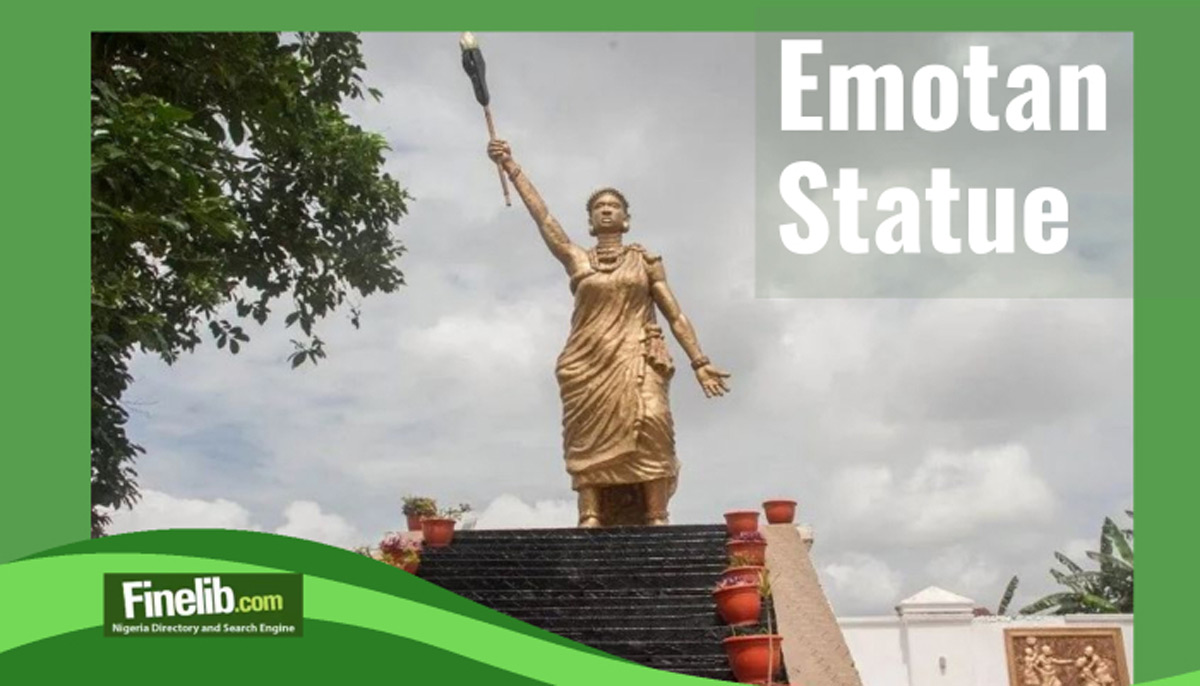The Emotan Statue: A Symbol of Love, Kindness, and Bravery

In the bustling city of Benin, Nigeria, stands a remarkable monument that pays tribute to the heroic deeds of a wonderful woman. The Emotan Statue, unveiled on March 20, 1954, serves as a testament to the kindness, love, and bravery of Emotan, a revered trader during the reigns of Oba Uwaifiokun and Oba Ewuare the Great.
This article delves into the intriguing history and significance of the Emotan Statue, shedding light on the inspiring story of Emotan and her enduring legacy.
The Life and Deeds of Emotan
Emotan, whose real name was Uwarraye, was a market woman who plied her trade at the Oba Market in the ancient kingdom of Benin during the 15th century. Despite not having any biological children, Emotan was known for her deep love and care for the children in her community.
She provided shelter and training for orphans and fostered numerous children, ensuring they had a chance at a better future. In the politics of Benin, Emotan held a crucial position despite her role as a caretaker.
During Prince Ogun's (later known as Oba Ewuare I) time in exile, Emotan became his confidante and protector. She risked her safety to hide him from his enemies, ultimately assisting him in reclaiming his rightful throne. Her bravery and loyalty were instrumental in ending the succession crisis and bringing stability to the kingdom.
The Deification of Emotan
Emotan's significance in Benin society was immense, and her influence was profound. Oba Ewuare held her in high regard, recognizing her exceptional qualities. The wish of Oba Ewuare was that they should bury her body in the Oba Market, her place of employment. In her honor, a sacred Uruhe tree was planted on her grave, symbolizing her eternal presence and the values she embodied.
Every man invested with a title for centuries, and all funeral processions paid homage to Emotan by visiting her gravesite. The Uruhe tree that stood as a living memorial to Emotan endured for over 300 years until it succumbed to natural forces during the reign of Oba Osemwende. In 1954, King Akenzua II commissioned a bronze statue of Emotan, ensuring her lasting memory. The figure remains in its original location in the center of Benin City.
The Significance of the Emotan Statue
The Emotan Statue holds immense cultural and historical significance for the people of Benin. It serves as a reminder of the importance of love, kindness, and bravery in society.
Emotan's selflessness and unwavering support for Prince Ogun exemplify the values that the Benin Kingdom holds dear. The statue not only honors Emotan's contributions but also celebrates the role of women in Edo society, highlighting their past recognition and respect.
Visiting the Emotan Statue
If you can visit Benin City, a trip to the Emotan Statue is necessary. Located opposite the Oba Market, the statue is a prominent symbol of heritage and resilience. As you approach, take a moment to appreciate the craftsmanship and artistry that went into creating this magnificent tribute.
While at the Emotan Statue, capture the moment by taking photographs. The statue's serene and dignified presence provides an excellent backdrop for memorable snapshots.
Additionally, take the time to learn about the rich history of Emotan and the significance of her deeds. Understanding the context behind the statue enhances the experience and enriches your knowledge of Benin's cultural heritage.
How to Get There
Getting to the Emotan Statue in Benin City, Nigeria, is relatively straightforward. Here are the general steps to help you get there:
1. By Air: If you are flying to Benin City, you can book a flight to Benin Airport, also known as the Benin City Airport. You can take a taxi or hire a private car to reach the Emotan Statue. The statue is located in a central area of the city and is easily accessible.
2. By Road: If you are coming from nearby cities or towns, you can reach Benin City by road. Benin City is well-connected by major highways, making it accessible from different parts of Nigeria. Once you get to the city, you can navigate to the Emotan Statue using a GPS device or by asking locals for directions.
3. Local Transportation: Benin City has various transportation options, including taxis and public buses. You can hire a cab or public transportation to reach the Emotan Statue. Ask for local directions or utilize a reliable navigation app to locate the statue.
4. Landmarks and Directions: The Emotan Statues' location is at Ring Road, a prominent area in Benin City. You can ask for directions to Ring Road or specifically mention the Emotan Statue to taxi drivers or locals, and they should be able to guide you there.
Safety and Accessibility
The Emotan Statue is in a safe and easily accessible area of Benin City. Visitors can explore the statue and its surroundings without any significant concerns. However, as with any travel experience, it is advisable to exercise caution and be mindful of your belongings.
Respecting the statue and the surrounding area without causing damage or littering is vital.
Remember to plan your visit, check the visiting hours, and consider the local customs and practices. The Emotan Statue is a significant cultural landmark in Benin City, symbolizing the brave acts of a legendary woman, and visiting it can be a meaningful experience for those interested in Nigerian history and heritage.
Conclusion
The Emotan Statue is a powerful symbol of love, kindness, and bravery. It immortalizes the remarkable life and deeds of Emotan, a woman who played a crucial role in the history of Benin.
Her selflessness and unwavering support for Prince Ogun during the political turmoil exemplify the values that continue to resonate with the people of Benin. As you stand before the Emotan Statue, reflect on this extraordinary woman's enduring legacy and the lessons her story imparts.




